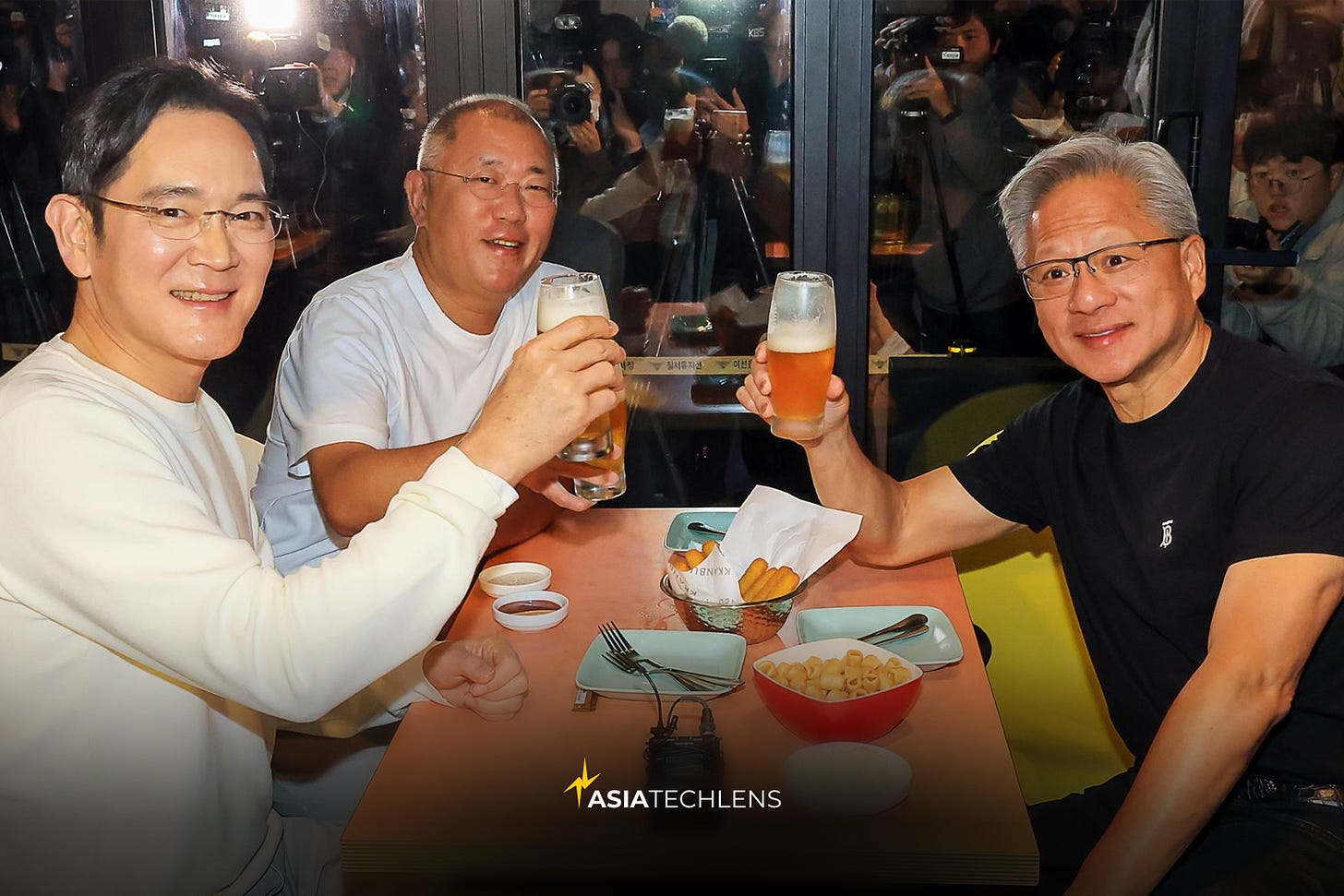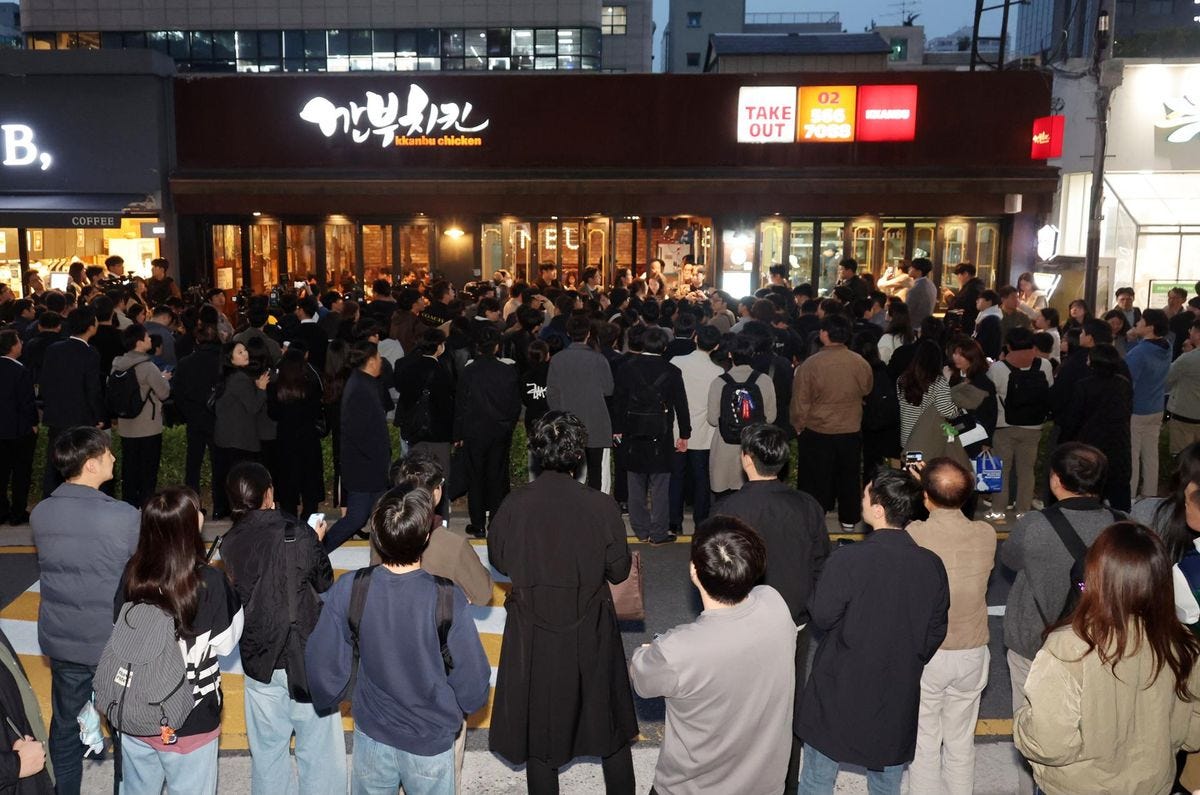When Fried Chicken and Beer Leads to a US$10 Billion Deal
Viral “chimaek” dinner propels South Korea into the global AI spotlight, but sovereignty risks linger

There was a viral moment on the internet last week featuring three tech billionaires. Leaders of NVIDIA, Samsung, and Hyundai went for dinner at a fried-chicken restaurant in Seoul—they paid for everyone’s meal. It was a successful photo op, but one that overshadowed a more important reckoning: South Korea is turning into a global AI powerhouse, and it’s providing a playbook for others who aspire to gain relevance in the global race for computing power.

The “NVIDIA effect”—or perhaps “Jensen Huang effect”—is not to be downplayed. When NVIDIA’s Jensen Huang met Samsung Electronics’ Lee Jae-yong and Hyundai Motor Group’s Euisun Chung on October 30, the scene drew a crowd. Reporters and onlookers packed the street, while photos of the three tech leaders quickly went viral. Overnight, “chimaek”—the combination of fried chicken and beer Korean workers often share at the dinner table after working hours—became a ritual known worldwide.
Shares of fried-chicken brands soared the following day, as did related industry players like a poultry processor. It also boosted semiconductor stocks and others deemed to receive tailwinds from AI-driven demand. The enthusiasm brought the benchmark KOSPI to close on October 31 with its biggest gain since 2001, having surged 20 percent throughout the month.
NVIDIA’s stock is also on a rally. Last week, on October 29, NVIDIA became the first company to reach a US$5 trillion valuation. Even without the viral dinner, it was a historic week.
But the “chimaek” dinner is an important turning point—both symbolically and chronologically. Symbolically, the dinner signals inclusion: NVIDIA’s founder is embracing Korean tech leaders as equals in the next chapter of AI. The fact that last week was Huang’s first visit to South Korea in 15 years drives that message home. Chronologically, it’s a milepost to a landmark deal. The day after the dinner, it was announced that NVIDIA will supply South Korea with hundreds of thousands of its most advanced chips.
The new supply of chips is predicted to change the trajectory of South Korea’s AI industry. The dream of “sovereign AI”—where a country has the ability to control its own AI systems, from infrastructure to AI-model scaling—will be closer in reach for the country. Or so it seems. Sovereignty is tricky in practice.
While the viral photos gave the world a reason to glance at South Korea, what it should really do is start paying attention.
What the chips could do
On Friday, at a press conference on the sidelines of the APEC Summit held in Gyeongju, NVIDIA announced that it would supply more than 260,000 of its Blackwell AI chips—its most advanced—to South Korea. The value of the deal wasn’t immediately revealed but was later reported to be worth up to US$10 billion, one of the largest GPU allocations to a single country.
With the deal in place, Korea is now competing for third place in compute capacity, with a projected total ownership of 300,000 GPUs. For context, the U.S. has about 20 million GPUs, followed by China, according to Huang in a closed-door meeting, as stated by a Korean official.
These chips would be distributed among different entities: 50,000 would be allocated to the Korean government; 50,000 each for Samsung Electronics, SK Group, and Hyundai Motor Group; and 60,000 for Naver Corporation. The chips would become integral to powering a national AI infrastructure centre, data centres, and ecosystems for autonomous driving, robotics, and smart manufacturing.
This is more than just a one-off GPU shipment. It’s a strategic repositioning of South Korea as a full-stack AI nation.
South Korea has already carved a spot for itself in the global AI supply chain. While NVIDIA’s GPUs are mainly manufactured by Taiwan’s TSMC, Korea is a supplier of memory and packaging. SK Hynix, a Korean semiconductor memory-chip manufacturer, is NVIDIA’s top High-Bandwidth Memory (HBM) supplier. Both SK Hynix and Samsung also provide advanced memory packaging and interposer technologies—crucial for connecting HBM to NVIDIA’s GPU dies, the small, rectangular silicon chips themselves.
The shipment of more than 260,000 chips would allow Korea to climb up the AI stack: from chip foundries to AI-model builders; from hardware exports to software intelligence.
The conundrum of sovereign AI
For all the fanfare surrounding the chip announcement, the deeper story lies in the risk that comes with South Korea’s growing closeness to NVIDIA. In the past week, there has yet to be a meaningful conversation on the topic. Everyone is still caught up in the hype.
On the surface, the partnership appears to bring the country closer to its ambition of achieving “sovereign AI.” But beneath the celebration is a budding tension.
The first risk is over-dependence. Relying on a single U.S. vendor for the computational backbone of Korea’s AI ecosystem exposes the country to potential geopolitical shocks. A future export-control decision or technology ban could paralyze the country. If sovereign AI is meant to guarantee local control, then a stack dominated by an American company presents a paradox: sovereignty built on someone else’s silicon.
The second risk is innovation complacency. Korea’s dependency on NVIDIA’s hardware could discourage the development of homegrown AI chips. In China’s case, the forced decoupling from U.S. technology has ignited a burst of domestic innovation—the opposite could happen in South Korea. Easy access to cutting-edge U.S. GPUs might reduce the incentive to take difficult, long-term bets on local research and development.
Still, the implications of this partnership extend beyond Korea. Other nations pursuing their own AI sovereignty will be watching closely. As PitchBook recently noted, the race to build sovereign AI could become a multitrillion-dollar global project—and South Korea has just positioned itself as one of its first large-scale experiments.
Whether that experiment becomes a case study in success or a cautionary tale will depend on how Seoul balances ambition with autonomy. For now, the world remembers the viral images of three billionaires drinking beer and devouring fried chicken—a deceptively light moment that concealed the heavy questions of sovereignty in the age of AI.


Thanks for this clear analysis; your insight into the 'NVIDIA effect' is astute, though the broader implications for national AI policy merit deeper consideraton.